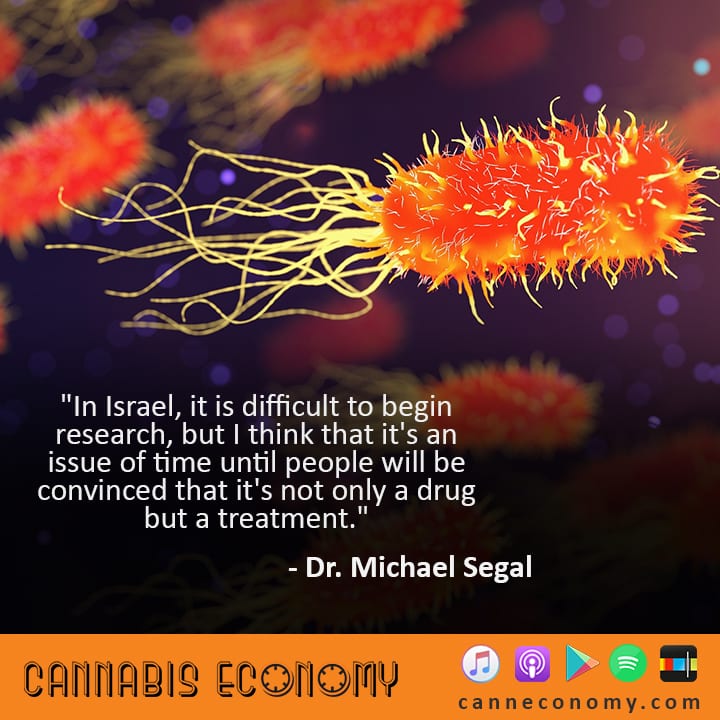
Ep. 432: Dr. Michael Segal, Shaar Menashe Hospital
May 16, 2019For eleven years, Dr. Michael Segal has been treating PTSD patients – mainly IDF veterans – with medical cannabis. Segal describes the incredible improvements he has seen in his patients: “If you see a post-traumatic patient before and after cannabis, you see two different persons.” Segal compares this type of success in Israel to the lack thereof in the United States in order to emphasize how important it is to prioritize our veterans’ mental health.
Transcript:
Seth: Dr. Michael Segal joins us. Welcome to Cannabis Economy. I'm your host, Seth Adler. Download episodes on caneconomy.com or wherever you currently get your podcasts. Caneconomy.com has a ton of direct insight these days, from science, policy, and business leaders in the space. First a word from Bedrocan and then Dr. Michael Segal.
Bedrocan is a patient-driven, global, pharmaceutical-minded cannabis company. Their entire end-to-end process is GMP certified through Dutch and ultimately European authorities. Bedrocan is the market leader in Europe for medical cannabis and has been the sole supplier to the Dutch government for 16 years. Through the Dutch government, Bedrocan provides product to 15 countries, currently. As a science-based company, Bedrocan invests in clinical research. The Leiden University conducted a double-blind, placebo-controlled clinical trial on fibromyalgia with Bedrocan products, which yielded promising results. They are now working on a follow-up to that study. Bedrocan is also working on the extent to which cannabis can reduce a reliability on opioids. Bedrocan believes that clinical research is key for the future of the company, standardized product, the industry, and the patient. Visit bedrocan.com for more information.
Dr. Segal: My name is Michael Segal. I am a psychiatrist. I am head of a department in the psychiatric hospital of Israel, its name is Sha'ar Menashe. I am also belong to the Technion Faculty of Medicine in Haifa, and I have my clinical practice in Haifa, and I treat a lot of patients, actually most of them, with post-trauma.
Seth: Okay.
Dr. Segal: A private practice.
Seth: So, let's dive in on your private practice with PTSD. How long have you associated cannabis with PTSD?
Dr. Segal: 11 years. This time, way before Pesach in 2008, this was my first patient, he convinced me that is something different that I knew.
Seth: He convinced you?
Dr. Segal: With the results of the treatment he received the approval to take cannabis and he changed dramatically from his previous condition that it was one of the worse that I saw.
Seth: Now, things have changed over the past 11 years of course. At the time, how did this all occur? You as the doctor, you as the physician, had to sign off on this, or he ... How did it occur?
Dr. Segal: I treated a lot of patients who were IDF veterans that were injured in the army. They were sent to me by the Ministry of Defense. I began to treat them, actually I treat in the private practice, and I saw that all of them, but moreso all those there that were post-traumatic, improved.
Seth: Improved. From cannabis use.
Dr. Segal: From cannabis use. All of them were treated with combination of treatment, medication that was accepted. Just know [inaudible 00:03:40] like mood stabilizer, like sleep pills, or anti-anxiety, but it was inefficient. Also psychotherapy was inefficient and so on.
Seth: When you say inefficient, how did we actually come to cannabis? I understand you have been convinced since then, but when you say inefficient, what were you seeing that wasn't working? That wasn't-
Dr. Segal: Inefficient? The main inefficiency was related to the traumatic memories, to the flashbacks, to the core symptoms of post-trauma. The depressive state probably was slightly influenced and maybe a little bit sleep, but the core symptoms that they suffered didn't improve with any treatment they received.
Read the full transcript:
Become a member to access to webinars, quarterly reports, contributor columns, shows, excerpts, and complete podcast transcripts
